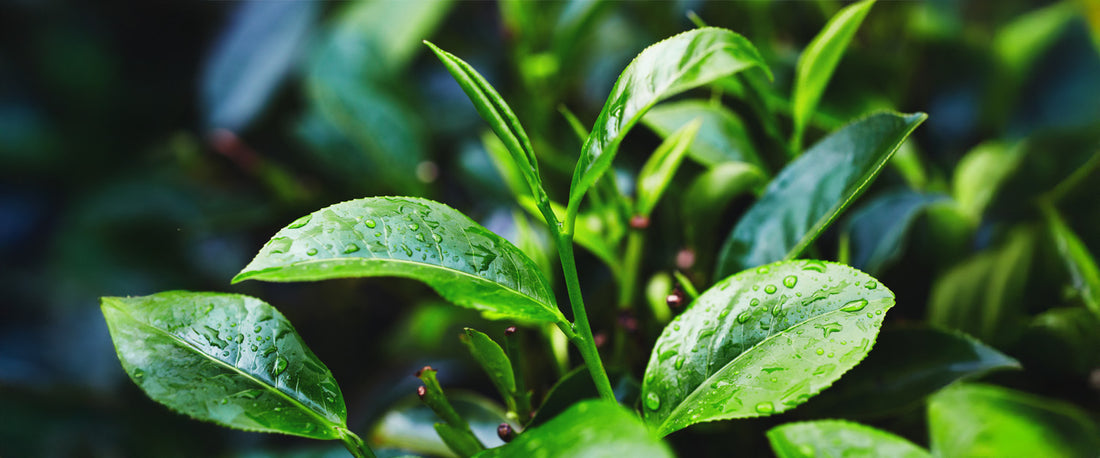Green tea, like black tea, is derived from the Camellia Sinensis plant. While both teas share the same origin, their processing methods make them distinct. Green tea has become the national beverage in countries like China, Thailand, and Japan, while India has carved its own niche in green tea production. Beyond conventional methods, India is excelling in the cultivation of a wide variety of teas—be it green, black, or herbal—through organic farming practices.
What is Organic Green Tea and How is it Different?
Before delving into the environmental advantages of organic green tea, it’s important to understand what sets it apart from its conventional counterpart. Organic green tea is cultivated and processed without the use of synthetic chemicals, whereas non-organic green tea is often grown with pesticides, herbicides, and chemical fertilizers. In organic farming, natural methods like composting and green manure are employed to maintain a sustainable yield, ensuring the health of both the soil and the crop.
To be certified as organic, tea must meet strict standards for consumer safety and environmental sustainability. The land where organic green tea or natural green tea is grown must be free of harmful chemicals for at least three years before it can be certified organic. Many believe that organic green tea offers a fresher, more robust flavor compared to conventionally grown varieties.
Environmental Advantages of Choosing Organic Green Tea
Opting for organic green tea gives you the opportunity to experience the purest form of natural green tea. As the demand for organic green tea increases, its production grows, benefiting our environment in several ways, as discussed below:
One of the key environmental benefits of growing organic green tea is the elimination of synthetic pesticides and fertilizers. Organic farming methods use natural alternatives like compost and biopesticides, which prevent soil degradation and water pollution. This helps protect nearby ecosystems, as toxic runoff is minimized. By avoiding chemical treatments, organic farms maintain the balance of local flora and fauna, promoting a healthier environment for wildlife and preserving the natural biodiversity of the region.
Growing organic green tea helps maintain and improve soil health through sustainable farming practices. Organic farming focuses on using natural compost, green manure, and crop rotation to enrich the soil. These methods not only preserve essential nutrients but also promote beneficial microorganisms, which improve soil structure and fertility. By reducing the need for synthetic fertilizers, organic farming helps prevent soil erosion, ensuring that the land remains productive for future generations.
Organic farming techniques used in organic green tea cultivation significantly conserve water resources. Practices like mulching, rainwater harvesting, and natural irrigation reduce water consumption. In addition, since synthetic chemicals are not used, there is less risk of water contamination from agricultural runoff. This ensures that local water bodies remain unpolluted, protecting aquatic ecosystems and reducing the environmental stress on freshwater resources, which are increasingly scarce in many parts of the world.
Organic tea plantations are often havens for biodiversity, supporting a range of plants, insects, and animals. By growing organic green tea, farmers avoid chemical pesticides, allowing natural predators to thrive and control pests. This creates a balanced ecosystem where different species coexist. Additionally, organic farming practices encourage the planting of shade trees and other crops, which further supports a diverse habitat for wildlife, contributing to healthier, more resilient ecosystems in tea-growing regions.
The cultivation of organic green tea contributes to a reduced carbon footprint compared to conventional farming. Organic methods, such as composting and the use of natural fertilizers, minimize the need for fossil-fuel-based inputs. Additionally, organic farms often rely on renewable energy and eco-friendly techniques, such as no-till farming, which reduce greenhouse gas emissions. By promoting carbon sequestration in the soil and minimizing energy use, organic tea farming plays a role in mitigating climate change.
Growing organic green tea encourages sustainable land use practices like agroforestry and shade-grown farming, which preserve natural landscapes. These methods reduce the need for deforestation and protect forest ecosystems, helping prevent land degradation. Organic farming also promotes long-term soil fertility and ecosystem balance, ensuring that the land remains productive for years to come. By integrating sustainable techniques, organic tea farms contribute to preserving the environment for future generations.
Goodricke: Pioneering Sustainable Organic Tea Farming in India
Goodricke, one of India’s most renowned tea brands, has become a leading advocate of organic tea farming in the country. Many of the tea estates owned and managed by Goodricke have made significant strides in organic tea cultivation. Notably, Goodricke's Darjeeling tea gardens have achieved carbon-negative operations, meaning they absorb more carbon than they emit. In 2022, these gardens sequestered 13 kilograms of carbon for every kilogram of tea produced. Additionally, Goodricke's Darjeeling estates employ organic farming methods, benefiting soil health and ensuring the well-being of humans and animals alike.
While working to minimize pesticide use, Goodricke still adheres to the use of safe, approved pesticides when necessary. Nineteen of Goodricke’s gardens are certified by the Ethical Tea Partnership, which promotes sustainable tea production and improves the lives of tea workers. These environmental initiatives reflect Goodricke's core belief that caring for the environment and communities is integral to their business philosophy.
Barnesbeg Organic Darjeeling Tea, from the House of Goodricke, exemplifies this commitment, offering a pure, organically grown tea cultivated in harmony with nature.
The Takeaway
Choosing organic green tea not only enhances your well-being but also plays a vital role in protecting the environment. By supporting organic farming, you contribute to reducing chemical usage, conserving water, preserving biodiversity, and promoting sustainable land use. Organic tea farming minimizes pollution, improves soil health, and reduces carbon emissions, making it an eco-friendlier option compared to conventional farming. When you opt for organic green tea, you are investing in a healthier planet and a more sustainable future. Embrace the choice that benefits both you and the environment—choose organic green tea.












